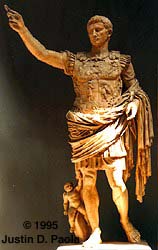What is an Emperor?
Since you've seen what ancient Rome looked like, now you should learn who made the laws you would have followed if you had lived there.
What is an Emperor?
Emperors were very important figures in ancient
Rome. Although they did not exist at the start of the empire, Romans
felt that one man was needed to act as the leader of the empire. The
emperor did not have unlimited power because there were other
important figures in the Roman government. Caesar Augustus was one of
the most famous Roman emperors.
Julius Caesar was also a ruler of Rome, but he ruled
as a dictator, not an emperor.

photo courtesy of "An Online Encyclopedia of Roman Emperors"
![]()
How was the Roman government organized?
Since the Romans did not want one man to make all of the laws, they decided to balance the power of the government between three branches: the executive branch, the legislative branch, and the judicial branch. The following table will tell you what each branch of the Roman government did.
|
|
|
|
|
The two leaders of the executive branch, the consuls, were elected for just one year by the upper class. They supervised the Senate and ordered the Roman army during wars. Other members of the executive branch were the tax collectors, mayors, city police, and other people in positions of power in cities. |
The most powerful part of the legislative branch was the Senate. The Senate was a group of about 300 male citizens who owned land. They could tell the consuls how much money they could spend and on what. These men were appointed by the consuls. |
The judicial branch had six judges who were elected every two years. They were in charge of deciding punishments that criminals would receive. Their job was similar to the job that judges have today in New Zealand. |
Would I have been able to vote in Rome?
In ancient Rome, you were not allowed to vote on laws or elect leaders of the government until you were an adult. Even then, only men who owned land were allowed to have a say in the laws.